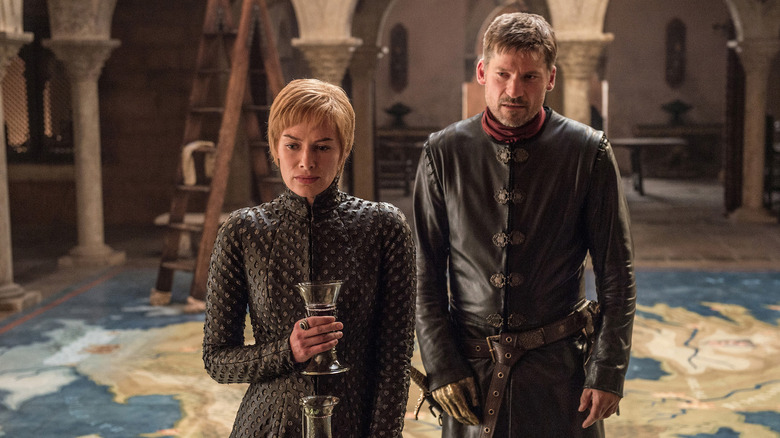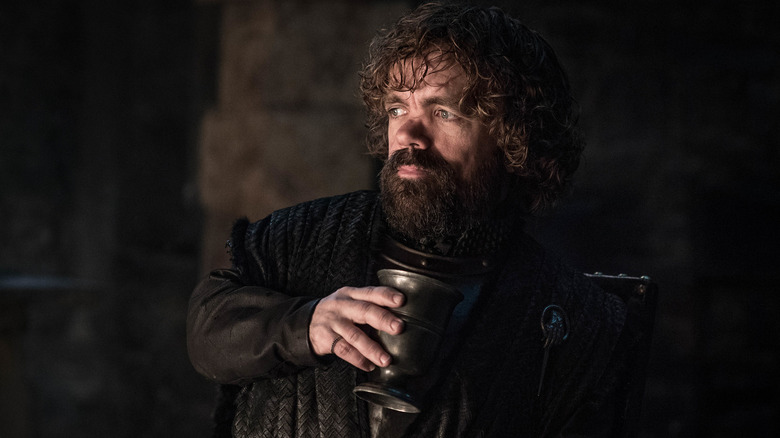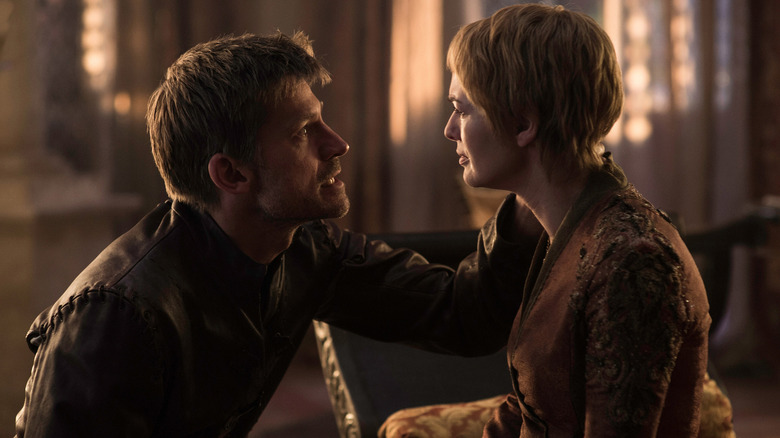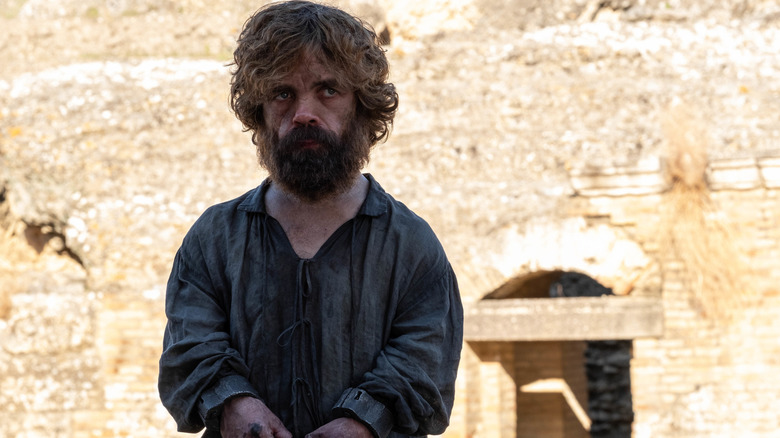Game Of Thrones Valonqar Theory - How HBO Ruined Cersei & Jaime's Endings
Saying that "Game of Thrones" dropped the ball on a lot of plot threads in its final season is, frankly, putting it mildly. Fans were incensed when, in May of 2019, the series ended after eight seasons with a truly truncated final run, with only six episodes to wrap up all of the unanswered questions left behind. Most of them were just ... left unanswered, while new ones arose, and everybody got really mad about it and basically stopped talking about the show because it betrayed them so horribly. So now we're here to relitigate it all again — or, more specifically, a really incredible fan theory that could have happened concerning Tyrion, Cersei, and Jaime Lannister (Peter Dinklage, Lena Headey, and Nikolaj Coster-Waldau, specifically).
A scene from George R.R. Martin's original series "A Song of Ice and Fire" that does make it into the show focuses on a prophecy made to Cersei concerning her children — namely, that they'll all die. That happens, but the show cuts the second part, where the fortune teller Maggy the Frog tells a young Cersei, "And when your tears have drowned you, the valonqar shall wrap his hands about your pale white throat and choke the life from you." So what's a "valonqar," and how could this have turned out on "Game of Thrones?" Honestly, it would have been incredibly cool.
It would have been pretty cool if Tyrion had taken down his older sister
In High Valyrian, "valonqar" roughly translates to "little sibling," so naturally, Cersei's attention turns to Tyrion. In the books and on the show, Tyrion is looked down upon and called the "half-man," and it's widely known that his difficult birth led to the death of his mother Joanna Lannister — and though Jaime has some affection for his younger brother, Cersei absolutely despises him. She never says it outright in the series because they cut that part of the prophecy, but it's easy to understand that if it had been included in the series, it would have made her motivations much clearer where Tyrion is concerned.
"Valonqar" is an interesting word, though — because while Cersei and Jaime are twins (and also lovers), Jaime is just slightly younger than his twin sister (who's also the mother of his children who all die). As the series progresses, Jaime finds himself horrified by the lengths to which Cersei will go to hold and maintain power, even going so far as to break with her entirely and team up with Tyrion in the last two seasons. (He returns to her, but we'll circle back to that in a second.) Wouldn't it have been awesome if, upon realizing that Cersei is a bloodthirsty maniac who will stop at nothing to sit upon the Iron Throne, Jaime had killed her for the greater good of the realm, earning his nickname of "kingslayer" for the second time and for the same reason as the first time? Yeah, it would have. There's an even cooler option, though.
Another fan theory has a great ending for Jaime and Cersei
In Season 5 of "Game of Thrones," Arya Stark (Maisie Williams) heads to a sort of finishing school in Braavos — if they taught you how to swap faces and work as a silent assassin in finishing school, that is. (Maybe they do, at some very particular ones.) Even before that, Arya, who watched several of her loved ones die in front of her, started quietly assembling a list of people she wanted to kill before she died — even though she did repeat it to herself before going to sleep every night, so maybe "quiet" is the wrong word — and guess who was on that list? Cersei Lannister.
Here's how things would have gone down on "Game of Thrones" in a fully just world: Arya would have snuck into the Red Keep during the sacking of King's Landing, killed Jaime, and stolen his face in the process. From there, she could have continued throughout the stronghold until she found Cersei, killed her too, and then removed her face right at the last second, showing Cersei that it wasn't her brother-lover who killed her after all. This would have satisfied the "valonqar" prophecy in the most technical of terms, and also? It would have been really, really cool.
So what happened to the Lannisters at the end of Game of Thrones?
None of that cool stuff is what happened at the end of "Game of Thrones," though. Here's what did. Let's begin with the dumbest part, which is that after Jaime abruptly deserts the show's good forces by telling his one-time lover Brienne of Tarth (Gwendoline Christie) that he's "hateful," he reunites with Cersei in the crumbling Red Keep and they get crushed to death by rocks just moments later. Moving on.
Tyrion, who's been working alongside Daenerys Targaryen (Emilia Clarke) as her Hand of the Queen for a few seasons at this point, is faced with a stark (get it?) realization at this point, based entirely on the fact that his boss committed mass genocide against King's Landing. He quits his job and convinces Daenerys' nephew-boyfriend Jon Snow (Kit Harington) to kill the queen for the greater good, which Jon more or less does immediately. So how does Tyrion close out the series? For completely unknown reasons and despite the fact that he's imprisoned for plotting (successfully) to kill Daenerys, he's not only allowed out of prison, but he chooses the next ruler of Westeros at a council of the realm's most powerful families, landing on Bran Stark (Isaac Hempstead-Wright). In the show's final moments, he's serving as Bran's Hand of the King, so, you know. All's well that ends well.



